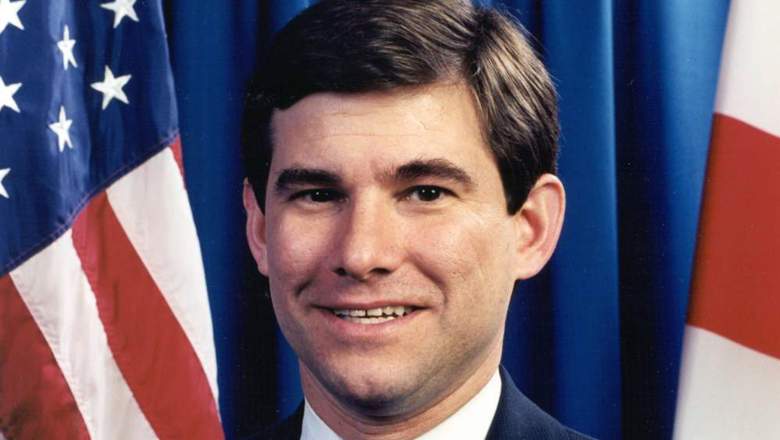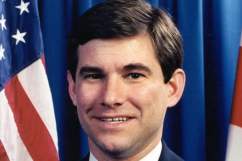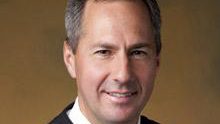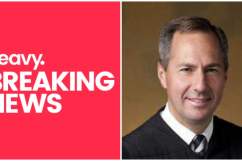
William Pryor. (Getty)
William Pryor is a federal judge on the U.S. court of Appeals for the 11th Circuit and was among the finalists for President Donald Trump‘s Supreme Court nominee. Pryor is known for his strong position against abortion and other conservative positions that made it difficult for Senate Democrats to vote for him when President George W. Bush nominated him to be a federal judge.
Pryor also has strong support from Jeff Sessions, who Trump appointed to be Attorney General. Pryor succeeded Sessions as Attorney General of Alabama and served his home state in that role until he became a federal judge in February 2004.
Here is a look at Pryor’s past statements on abortion.
1. Pryor Has Called Abortion ‘Murder’ & Says He Supports the ‘Right to Life of Every Unborn Child’
In 2002, Pryor was asked by the pro-choice group NARAL for his opinion on abortion. According to a report on Pryor the group did when Bush nominated him, Pryor responded:
Abortion is murder, and Roe v. Wade is an abominable decision. As Professor Ely stated, ‘Roe is not constitutional law and gives almost no sense of an obligation to try to be.’ I support the right to life of every unborn child.
2. He Said the Day the Roe v. Wade Decision Was Made Was the Day the Supreme Court ‘Ripped Out the Life of Millions of Unborn Children’
During his confirmation hearings in 2005, Senator Orrin Hatch of Utah asked Pryor how he would treat Roe v. Wade if he got on the 11th Circuit Court of Appeals. Pryor responded:
Well, my record as Attorney General shows that I am able to put aside my personal beliefs and follow the law, even when I strongly disagree with it, to look carefully at precedents and to do my duty. That is the same duty that I would have as a judge. Now, as an advocate for the State of Alabama of course I have an obligation to make a reasonable argument in defense of the law, but as a judge I would have to do my best to determine from the precedents what the law actually at the end of the day requires. My record demonstrates that I can do that.
When asked if he would act in accordance with Roe v. Wade even if he disagreed with it, he said he would. When Hatch pressed again, Pryor replied, “You can take it to the bank, Mr. Chairman.”
Despite these comments during the hearing, Pryor had more harsh words for Roe v. Wade in other venues. In 1997, Pryor said, “I will never forget Jan. 22, 1973, the day seven members of our highest court ripped the Constitution and ripped out the life of millions of unborn children.”
3. Sessions Praised Pryor’s Stance on Abortion
Pryor was appointed to his position as a federal judge during a Congressional recess and the Senate later approved Pryor in a 53-45 vote in June 2005, notes Time Magazine. Based on the fight Democrats put up in 2004, Pryor’s chances to get the nomination are reportedly slipping so Republicans can avoid that.
In a statement in the Senate, Sessions specifically praised Pryor for his stance on abortion. Here is what Sessions said:
on the issue of abortion, Judge Pryor has made clear he personally does not believe in abortion. He does not believe it is right. He believes it is wrong. It is not just because he is a Catholic, it is not just that his views are consistent with the Pope’s or the Catholic Church of which he is a part, or many other churches and leaders in our country, but he has thought about this issue personally and deeply. He has given it serious consideration. He has made a judgment that, in his view, life and freedom and liberty in our country are diminished if the unborn are not given protection. That is a legitimate position in America, held by tens of millions of people and many leaders in this country. Certainly no one can deny that. Certainly, because someone believes the pro-life way is the best way, they should not be disqualified from being a judge. He has concluded Roe v. Wade was not a principled constitutional decision. Ruth Bader Ginsburg, the ACLU lawyer who President Clinton nominated to the Supreme Court of the United States, has also raised questions about the constitutional integrity of Roe v. Wade. That is his view about it.
4. Pryor Advocated for Different Abortion Policies in Different States
After Bush nominated him, those opposed to Pryor’s stance on abortion frequently cited speeches he delivered throughout his tenure as Alabama attorney general. For example, People For The American Way (PFAW) noted that he said in a 2000 speech titled “Improving the Image of the Legal Profession by Restoring the Rule of Law” that different states should have different regulations for abortions based on the ideology of its citizens.
“In conservative states like Alabama, the regulation of abortion would be different from the regulation of abortion in more liberal states like California,” Pryor said in the speech.
In a commencement address to Independent Methodist School graduates, PFAW notes that Pryor said, “I submit that a government that does not allow its people, by a majority vote, to restrict the murder of innocent life or the assisted suicide of some of our most vulnerable citizens is not a rightly ordered political community.”
5. Pryor Would Only Support Abortion if the Woman’s Life Is in Danger
In its original report on Pryor, the pro-choice group NARAL found that Pryor only supported abortion if the mother’s life was in jeopardy. He opposes it even in cases of rape or incest.
According to NARAL, it sent its pro-choice survey to Pryor when he was still attorney general in Alabama. He marked that the statement “Abortion should be legal only when the life of the woman is endangered” reflected his views on abortion. Pryor did not chose the option “Abortion should be legal only when the life of the woman is endangered or in cases of rape or incest” on the survey.


